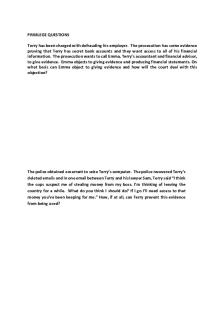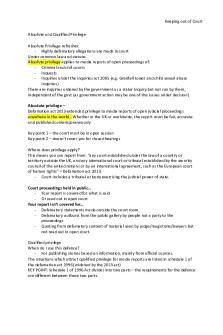Lecture 4 - Absolute and Qualified Privilege PDF

| Title | Lecture 4 - Absolute and Qualified Privilege |
|---|---|
| Course | Keeping out of Court |
| Institution | Nottingham Trent University |
| Pages | 3 |
| File Size | 73.5 KB |
| File Type | |
| Total Downloads | 42 |
| Total Views | 159 |
Summary
absolute and qualified privilege...
Description
Keeping out of Court Absolute and Qualified Privilege Absolute Privilege refresher: - Highly defamatory allegations are made in court Under common law and statute: Absolute privilege applies to media reports of open proceedings of: - Criminal and civil courts - Inquests - Inquiries under the inquiries act 2005 (e.g. Grenfell tower and child sexual abuse inquiries) There are inquiries ordered by the government as a stator inquiry but not run by them, independent of the govt (as government action may be one of the issues under decision) Absolute privilege – Defamation act 2013 extended privilege to media reports of open judicial proceedings anywhere in the world… Whether in the UK or worldwide, the report must be fair, accurate and published contemporaneously Key point 1 – the court must be in open session Key point 2 – doesn’t cover you for closed hearings Where does privilege apply? This means you can report from: “any court established under the law of a country or territory outside the UK, and any international court or tribunal established by the security council of the united nations or by an international agreement, such as the European court of human rights” = Defamation act 2013. - Court includes a tribunal or body exercising the judicial power of state. Court proceedings held in public… - Your report is covered for what is said - Or read out in open court Your report isn’t covered for… - Defamatory statements made outside the court room. - Defamatory outburst from the public gallery by people not a party to the proceedings - Quoting from defamatory content of material seen by judge/magistrate/lawyers but not read out in open court. Qualified privilege When do I use this defence? - For publishing stories based on information, mainly from official sources. The situations which attract qualified privilege for media reports are listed in schedule 1 of the defamation act 1996 (widened by the 2013 act) KEY POINT: Schedule 1 of 1996 Act divides into two parts – the requirements for the defence are different between these two parts.
Keeping out of Court Key situations I may be in where I can use part 1 of qualified privilege: - Where it gives you legal protection for the reports I am going to be writing at parliaments. - Any debates or committees that go on at parliament in open either within the UK or worldwide are where I could use this defdence - Any material which is official made available to journalists by the government e.g. reports of parliamentary proceedings within hansard and official government press releases both in the UK, and worldwide, I would have legal protection for reporting those. - Any central government worldwide that sets up a public inquiry, I can use qualified privilege for what is said, at the inquiry - Sometimes, under law, documents have to be mad available to the public, this includes court lists as well as records from company health, land registry, documents made available to you in civil court cases, all of this I can report from - If I am referring to a past court cases which includes someone’s reference to a previous conviction, I can quote from a court case that has been held anymore in the UK in open or anywhere around the world, all these covered by qualified privilege. Why do you need a defence? Qualified privilege for media reports under part 1 of the schedule to the defamation act 1996. It protects you if someone says something defamatory towards you, as long as it’s the following… Criteria attached to successfully using this defence - Fair - Accurate - Published without malice (ill will or spite towards the claimant) - Is about a matter of public interest - And is published for the public benefit When does part 2 apply? (more day to day journalistic use) (full list, see notes) - Council meetings, all open council meetings and their committees within the UK, you can report what is said from there. - Any government commissions or tribunal in the u including any disciplinary panels that are open to the public, you can report from there. - Local inquires, including planning inquires - General meeting of a general UK listed company - Public meeting and press conference - Police/local council as an official press release - Any official findings of a public inquiry - 2013 act says you can cover the proceedings scientific and academic conferences worldwide and any articles that are based on material from them - Some associations and governing bodies you can’t get into, but they’ll announce their findings and you are covered by them. - The findings of an association or a governing body all around the world that has the power to discipline its members, I have qualified privilege for when they announce their findings.
Keeping out of Court Requirements for part 2: Report must be: - Fair - Accurate - Published without malice - Is about a matter of public interest - And is published for the public benefit
If requested by a party defamed in the statement, the media must publish a reasonable letter or statement by way of contradiction or explanation. What’s the difference? - The person must have the right of making a reasonable reply or explanation If and when they ask for it. - You do not have to do this before you publish. - But you must do this when and if they ask - Defence fails if you don’t and you will be sued - If their reply is defamatory about someone else, it is not reasonable – seek legal advice....
Similar Free PDFs

Privilege AND Immunity
- 11 Pages

Disclosure inspection and privilege
- 36 Pages

Privilege Questions
- 1 Pages

Study Question 4 Absolute Space
- 2 Pages

Privilege notes
- 20 Pages

Privilege Chapter 23 Notes
- 6 Pages

Client Legal Privilege
- 6 Pages

Relative and Absolute Gains Word
- 10 Pages
Popular Institutions
- Tinajero National High School - Annex
- Politeknik Caltex Riau
- Yokohama City University
- SGT University
- University of Al-Qadisiyah
- Divine Word College of Vigan
- Techniek College Rotterdam
- Universidade de Santiago
- Universiti Teknologi MARA Cawangan Johor Kampus Pasir Gudang
- Poltekkes Kemenkes Yogyakarta
- Baguio City National High School
- Colegio san marcos
- preparatoria uno
- Centro de Bachillerato Tecnológico Industrial y de Servicios No. 107
- Dalian Maritime University
- Quang Trung Secondary School
- Colegio Tecnológico en Informática
- Corporación Regional de Educación Superior
- Grupo CEDVA
- Dar Al Uloom University
- Centro de Estudios Preuniversitarios de la Universidad Nacional de Ingeniería
- 上智大学
- Aakash International School, Nuna Majara
- San Felipe Neri Catholic School
- Kang Chiao International School - New Taipei City
- Misamis Occidental National High School
- Institución Educativa Escuela Normal Juan Ladrilleros
- Kolehiyo ng Pantukan
- Batanes State College
- Instituto Continental
- Sekolah Menengah Kejuruan Kesehatan Kaltara (Tarakan)
- Colegio de La Inmaculada Concepcion - Cebu







